Related Research Articles

Jean Sibelius was a Finnish composer of the late Romantic and early modern periods. He is widely regarded as his country's greatest composer, and his music is often credited with having helped Finland develop a stronger national identity when the country was struggling from several attempts at Russification in the late 19th century.

Esa-Pekka Salonen is a Finnish conductor and composer. He is the music director of the San Francisco Symphony and conductor laureate of the Los Angeles Philharmonic, Philharmonia Orchestra in London and the Swedish Radio Symphony Orchestra. In 2024, he announced his resignation from the San Francisco Symphony upon the expiration of his contract in 2025.

Einojuhani Rautavaara was a Finnish composer of classical music. Among the most notable Finnish composers since Jean Sibelius (1865–1957), Rautavaara wrote a great number of works spanning various styles. These include eight symphonies, nine operas and fifteen concertos, as well as numerous vocal and chamber works. Having written early works using 12-tone serial techniques, his later music may be described as neo-romantic and mystical. His major works include his first piano concerto (1969), Cantus Arcticus (1972) and his seventh symphony, Angel of Light (1994).
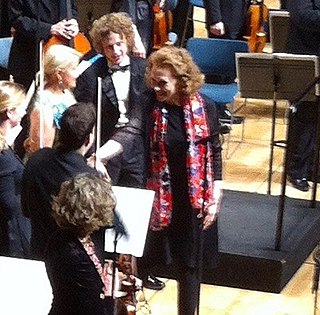
Kaija Anneli Saariaho was a Finnish composer based in Paris, France. During the course of her career, Saariaho received commissions from the Lincoln Center for the Kronos Quartet and from IRCAM for the Ensemble Intercontemporain, the BBC, the New York Philharmonic, the Salzburg Music Festival, the Théâtre du Châtelet in Paris, and the Finnish National Opera, among others. In a 2019 composers' poll by BBC Music Magazine, Saariaho was ranked the greatest living composer.

Magnus Gustaf Adolf Lindberg is a Finnish composer and pianist. He was the New York Philharmonic's composer-in-residence from 2009 to 2012 and the London Philharmonic Orchestra's composer-in-residence from 2014 to 2017.

The Sibelius Academy is part of the University of the Arts Helsinki and a university-level music school which operates in Helsinki and Kuopio, Finland. It also has an adult education centre in Järvenpää and a training centre in Seinäjoki. The Academy is the only music university in Finland. It is among the biggest European music universities with roughly 1,400 enrolled students.

Per Nørgård is a Danish composer and music theorist. Though his style has varied considerably throughout his career, his music has often included repeatedly evolving melodies—such as the infinity series—in the vein of Jean Sibelius, and a perspicuous focus on lyricism. Reflecting on this, the composer Julian Anderson described his style as "one of the most personal in contemporary music". Nørgård has received several awards, including the 2016 Ernst von Siemens Music Prize.
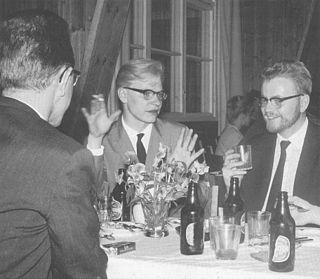
Erkki Olavi Salmenhaara was a Finnish composer and musicologist.

Erik Valdemar Bergman was a composer of classical music from Finland.

Sven Einar Englund was a Finnish composer.
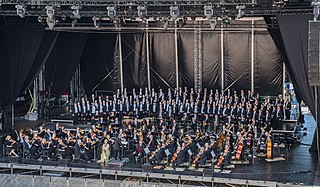
The Helsinki Philharmonic Orchestra is an orchestra based in Helsinki, Finland. Founded in 1882 by Robert Kajanus, the Philharmonic Orchestra was the first permanent orchestra in the Nordic countries. Today, its primary concert venue is the Helsinki Music Centre; the current chief conductor is Jukka-Pekka Saraste, who has held his post since the start of the 2023–24 season..

Paavo Johannes Heininen was a Finnish composer and pianist.

Kari Kriikku is a Finnish classical clarinetist.
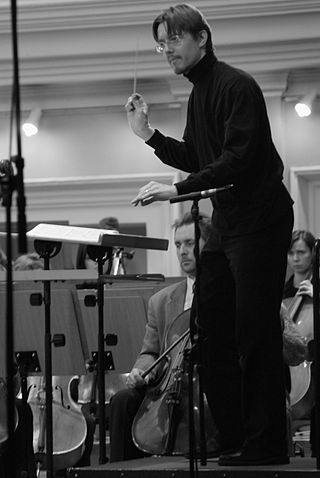
Sasha Aleksi Mäkilä is a Finnish conductor.
Jukka Santeri Tiensuu is a Finnish contemporary classical composer, harpsichordist, pianist and conductor.

Tomi Räisänen is a Finnish composer.
Glenda Dawn Goss is an American author and music historian whose special interests are music and culture, early modernism, critical editing, and European-American points of cultural contact. Her most notable work has revolved around the life and works of the Finnish composer, Jean Sibelius.
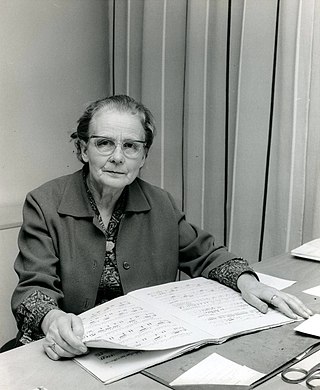
Helvi Lemmikki Leiviskä was a Finnish composer, writer, music educator, and librarian at the Sibelius Academy.

The Wihuri Sibelius Prize is a music prize awarded by the Wihuri Foundation for International Prizes to prominent composers who have become internationally known and acknowledged. The Wihuri Sibelius Prize is one of the biggest and most prestigious music prizes in the world of classical music. The first Sibelius Prize was awarded to Finnish composer Jean Sibelius, whom the prize was named after, in 1953. By 2021, the Wihuri Foundation for International Prizes has awarded altogether 19 Wihuri Sibelius Prizes, the latest award climbing up to €150,000 and awarded to Finnish composer Jukka Tiensuu. The Wihuri Sibelius Prize winner is selected by a five-member committee that consists of experts from Finnish music institutions. The prize may be awarded to private individuals or organizations regardless of nationality.

My Own Land, Op. 92, is a single-movement, patriotic cantata for mixed choir and orchestra written in 1918 by the Finnish composer Jean Sibelius. The piece, which is a setting of Kallio's Finnish-language poem of the same name, is chronologically the sixth of Sibelius's nine orchestral cantatas; in particular, it belongs to the series of four "little known, but beautiful" cantatas from the composer's mature period that also includes Song of the Earth, Hymn of the Earth, and Väinämöinen's Song. My Own Land premiered on 25 October 1918 in Helsinki with Armas Maasalo conducting the Helsinki Youth League —the commissioning ensemble and dedicatee—and the Helsinki Philharmonic Orchestra.
References
- ↑ Virtamo, Keijo, ed. (1997). Otavan musiikkitieto: A–Ö (in Finnish). Helsinki: Otava. p. 25. ISBN 951-1-14518-5.
- ↑ Sadie, Julie Anne; Samuel, Rhian (1994). The Norton/Grove dictionary of women composers. ISBN 9780393034875 . Retrieved 4 October 2010.
- ↑ "Repro program". Archived from the original on 13 April 2010. Retrieved 12 October 2010.
- ↑ "Philosophy of Music Education Review".
- ↑ White, John David; Christensen, Jean (2002). New music of the Nordic countries. p. 259. ISBN 1-57647-019-9.